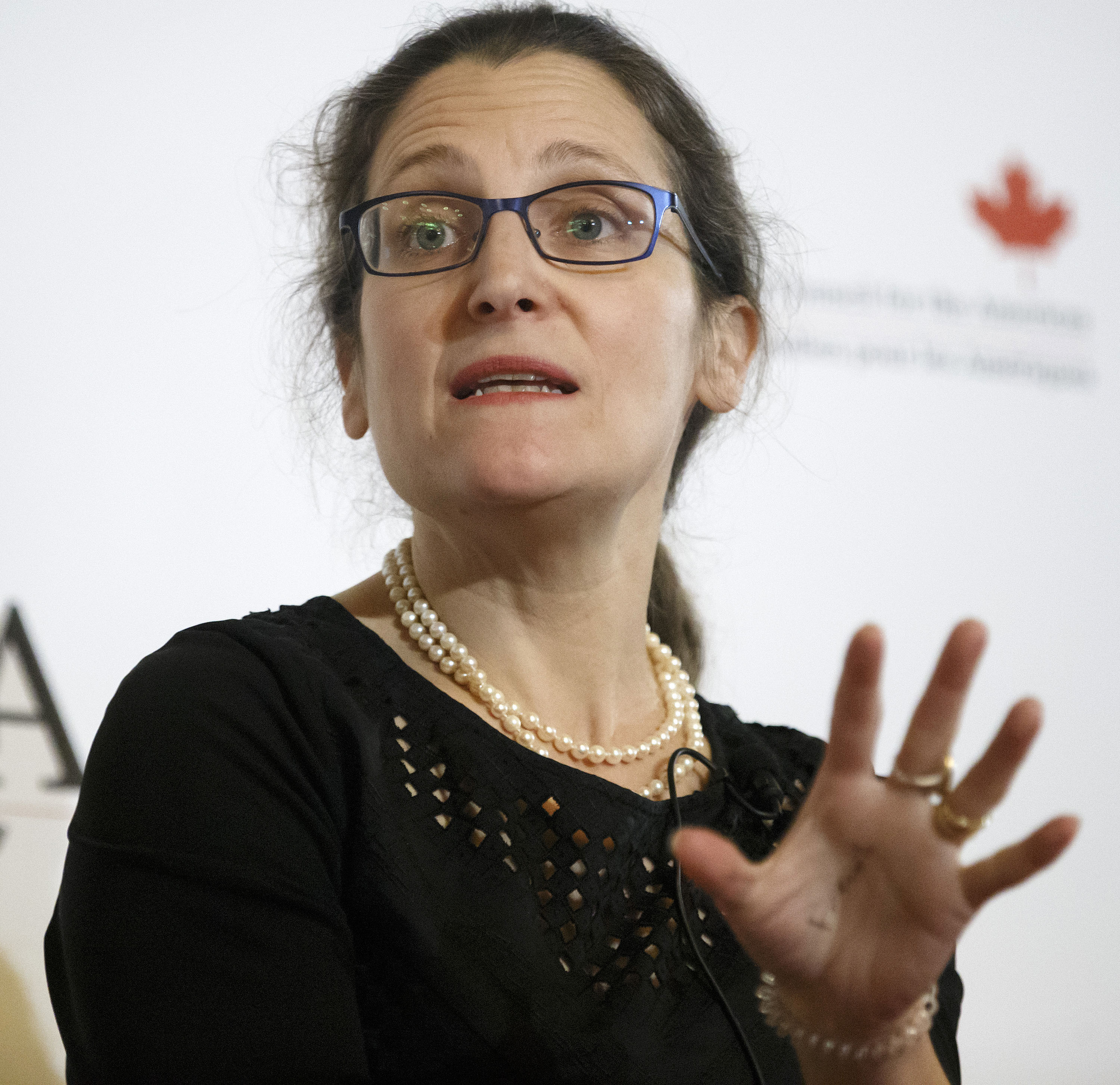Canada’s foreign minister says Russia is spreading disinformation about her grandfather

OTTAWA – Canada’s chilly relations with Russia have taken a nasty turn with charges of disinformation leveled by Canadian Foreign Minister Chrystia Freeland against Russia over allegations that her long-dead, Ukrainian-born grandfather was a Nazi collaborator in occupied Poland.
Freeland, a 49-year-old former journalist and fluent Russian speaker who was once Moscow bureau chief for the Financial Times of London, has long been on the outs with the Russian government for her outspoken support of Ukraine and her books exposing the influence of Russia’s oligarchs.
Three years ago, as an opposition member of the Canadian House of Commons, Freeland was barred from entering Russia along with a dozen other prominent Canadians in retaliation for sanctions imposed by Canada after Russia’s annexation of Crimea.
After Justin Trudeau became prime minister in 2015, Freeland was named to his Liberal Party Cabinet, and in January was promoted to the global affairs portfolio, the Canadian equivalent of foreign minister. Moscow officials soon made it clear that they had no intention of lifting the ban on her travels to Russia.
Since her appointment, articles about Freeland’s family history have been spread over the Internet by Putin-leaning websites such as the Russian Insider and the New Cold War. A typical article in Consortium News, titled “A Nazi Skeleton in The Family Closet,” alleges that Freeland’s maternal grandfather, Mikhailo Chomiak, ran a Ukrainian-language newspaper in occupied Krakow during the 1940s that spread Nazi propaganda.
Chomiak immigrated to Canada after the war and became a prominent member of the large Ukrainian Canadian community in the province of Alberta, where Freeland was born. He died in 1984.
Asked this week about the spread of these allegations, Freeland linked the articles to Russian efforts at disinformation.
“I don’t think it’s a secret,” she told reporters after announcing a two-year extension of a Canadian military training mission in Ukraine. “American officials have publicly said and even (German Chancellor) Angela Merkel has publicly said that there were efforts on the Russian side to destabilize Western democracies, and I think it shouldn’t come as a surprise if these same efforts were used against Canada.”
A spokesman for the Russian Embassy in Ottawa, Kirill Kalinin, said he could not confirm or deny the stories about Freeland’s grandfather. He added that the Russian government thinks strongly that “Nazism and its hateful ideology, Nazi collaborators and followers should be unequivocally condemned.” In an earlier interview with the Globe and Mail, he specifically criticized Freeland, saying that she had “avoided giving a direct answer as to what her grandfather was doing in Krakow during World War II.”
Kalinin told The Washington Post that Russia continues to support bilateral ties with Canada, particularly in areas of common interest such as the Arctic and counterterrorism, despite occasional “name-calling originating from Ottawa.”
Many of the articles appear to have been inspired by John Helmer, a Moscow-based journalist who was described by Jeremy Kinsman, a former Canadian ambassador to Russia, as a notorious “conspiracy theorist.” Kinsman said that the Russian government remains convinced that Canada’s policies “are driven by Russophobic Ukrainian Canadians” who have considerable electoral clout, particularly in western Canada.
Relations between Canada and Russia sank to new lows during the final years of the government of Canadian Prime Minister Stephen Harper, who only reluctantly shook President Vladimir Putin’s hand at a summit in 2014 and reportedly told him, “You need to get out of Ukraine.” Diplomatic interchanges between the two countries basically stopped.
Things have thawed a bit since those days, with Freeland meeting last month in Germany with Russian Foreign Minister Sergei Lavrov, although there seems little sign that her travel ban will be lifted. The embassy spokesman said it’s up to Canada to take a first step if it wants to see sanctions and Russian countermeasures lifted.
The Globe and Mail reported that one of Freeland’s uncles, a retired academic, had acknowledged in an article several years ago that Chomiak had worked for a publication that spread anti-Semitic propaganda, but he never signed anything that appeared in the paper. A spokesman for Freeland, Alex Lawrence, told the Globe and Mail that she supported efforts by her uncle to study “this difficult chapter in her late grandfather’s life.”
Asked about the allegations, Lawrence said, “People should be questioning where this information comes from and the motivations behind it.” He declined to comment when contacted by The Post.